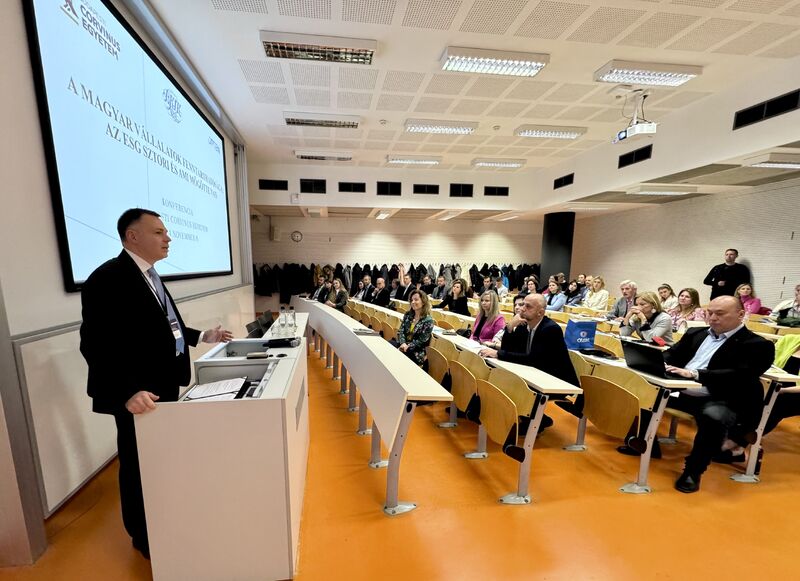More experts are essential for the success of the ESG report

More than a thousand companies will have to report on ESG from 2025 in Hungary, requiring a significant number of experts and consultants. However, so far there are only a few private and legal entities that are accredited – that was the main message of a conference on corporate sustainability in Hungary, “The ESG story and what lies behind”, held at Corvinus University.
Universities have an important role to play in bridging the gap, which is why more ESG-related postgraduate programmes are being launched at Corvinus. In addition, a publication entitled “ESG körkép 2024” has been published in cooperation with the Budapest Chamber of Commerce and Industry, Opten and the IVE Association, edited by the Institute of Sustainable Development of Corvinus University of Budapest.
The publication aims to present the latest developments in the field in a visible and tangible way. “Change comes as a fast train, which either goes away or we get on it,” said Dr Attila Jámbor, Head of the Institute at the conference launching the publication.
“In the 21st century, you can’t walk out of university without having attended sustainability classes. The younger generation is increasingly committed to sustainability, and it is already an inescapable concept in business, too.”
More information about the ESG postgraduate programmes at Corvinus can be found on this page (in Hungarian), and more information about the master’s programme in Sustainability Management and Entrepreneurship can be found here.
ESG approaches have been developed to focus on a specific area, but not yet in a complex way
A growing number of experts agree that we have entered the Anthropocene era, when humans will irreversibly transform the planet. In such a world, climate change and ecological sustainability are among the most important issues for our future. The planet’s resources are finite, so it is essential to develop new economic models.
The challenges of the global economy require a regulated industrial policy response at European level to balance sustainability and competitiveness, according to the conference. Knowledge and innovation are at the heart of industrial development and sustainability, but broad participation is essential to create, disseminate and share it. The results of the analysis were presented by Dr László Trautmann and Mihály András Mihele, from the “Ifjúsági Vállalkozásélénkítő Egyesület”.
Closer cooperation between government, the market and communities are also needed. Shared goals and democratic decision-making can lead to effective regulation. The first step is to communicate the problem and raise the moral dilemmas, and then to find solutions democratically. Regulation can only be the result of this process; it cannot be reversed. ESG (Environmental, Social, Governance) principles must be applied not only at the corporate level, but also at the community level.
In terms of sustainability, Opten’s ESG index, also presented at the conference, offers interesting insights. The weakest performance is seen in the area of environmental indicators, but there are also significant differences between industries and dispersion within industries. Often companies do not have a complex understanding of ESG issues, but rather focus on one area, an approach that could put them at a disadvantage in future markets.
Data collection, polarized thinking and interpretation of rules are the biggest challenges
Data collection is currently one of the biggest difficulties for companies, as there is a lack of a standardized system, which also includes many qualitative elements. This was the conclusion of a summary of case studies in the publication, presented at the conference by Anett Zanócz, PhD student at Corvinus. The focus of the research was on sustainability reporting and certification, measured through semi-structured interviews with ESG experts and corporate managers.
Polarized thinking is also a common problem in companies on sustainability in the value chain, with employees at different levels thinking differently about the issue. The third common difficulty was the interpretation of regulations, which is a major challenge for companies.
For real impact from ESG reporting, strategic integration is also needed in everyday operations. It’s not enough to comply with the rules, we have to go further. This requires first identifying roles in relation to ESG, and then professionals who are generalists with interdisciplinary knowledge and who can integrate a wide range of different areas and mindsets into decision-making.
IT support is also important, as there is a lot of data to work with, which could be simplified by the use of appropriate software.
For real systemic change, everyone is needed, so involvement, participation and democracy are essential
The principle of gradual change is important for long-term commitment, as poorly prepared change can disengage people at different levels of the organization. It requires clear and transparent communication so that everyone in the organization is in the same boat.
Grassroots initiatives are much more motivating, experts say, and at the end of the process will be the real competitive advantage. Democracy inside the enterprise was highlighted as a possible way for real sustainability. This also means that employees should think like entrepreneurs when it comes to their company and that they should have a real opportunity to influence the processes on the other side.
At a systemic level, a comprehensive international strategy will be essential to make a difference globally. However, the lack of transparent data is already a competitive disadvantage that will only increase in the future.
With so much information, it is difficult to get a good overview of what is really sustainable, and education has an important role to play. We also have to answer together the question from the audience: ‘what is it that we want to sustain? Current social structures, culture, civilization or life itself?’
Author: Máté Kovács

